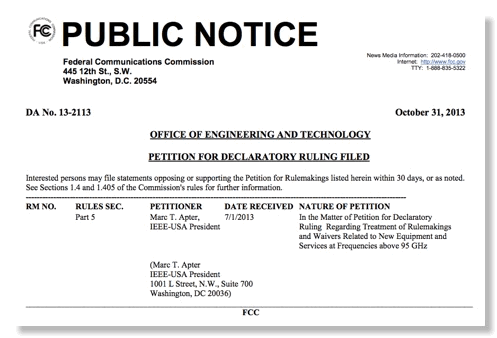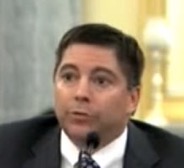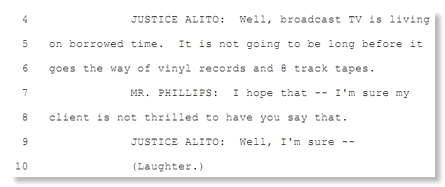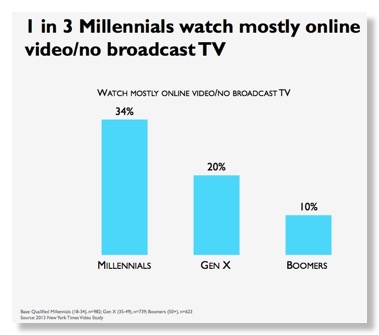FCC Requests Comment on IEEE-USA >95 GHz Petition

In a Halloween present to your blogger, FCC released the above PN asking for comment on the previously discussed IEEE-USA petition to expedite deliberations on technology >95 GHz in accordance with the terms of Section 7 of the Communications Act.
In an apparent clerical error they omitted either an RM number or a Docket number creating an ambiguity on how to actually file comments. A knowledgeable source says this happens sometimes and is normally corrected in a day or 2.
We look forward to seeing your comments.
vox populi, vox dei
UPDATE
FCC issued an erratum on November 1 and now this issue is docketed as ET Doc. 13-259.
By my calculation, comments are due December 2, 2013.
For those who do not do this often, the link for uploading a comment into this docket is at
http://apps.fcc.gov/ecfs/upload/display?z=e83p0
Convert your comments to .pdf format before uploading to FCC
.
Remember to enter 13-259 in the first entry block labeled
“Proceeding Number: ![]() ”
”
If you need any help, place contact your blogger
And Then There Were 5


Most nominees to most federal regulatory commissions have been former Senate staffers in the past decade or 2. This is probably a way to break the partisan deadlock by picking nominees known to the confirming body. Former Senate staffers are usually great people, but at some point the body politic should contemplate whether their over representation in regulatory agencies, to the exclusion of those with other backgrounds, is really a good idea.
This is not to say there are not Senate staffers with credentials that have been lacking with FCC appointees in recent memory. For example, former Senate staffer Peter B. Lyons has a CalTech doctorate and was a commissioner at the Nuclear Regulatory Commission. He now serves at DOE as Assistant Secretary for Nuclear Energy. We just haven’t seen this type of appointment at FCC in memory even though FCC has significant technical jurisdiction.
Note that FCC has yet to have any commissioner from either party who has actually worked in Silicon Valley in either a technical or nontechnical capacity. However, there have been lots with a broadcast background.
NTIA and NIST to host Innovative Spectrum Sharing Technology Day Event
President Obama, supported by the President's Council of Advisors on Science and Technology, has focused on the use of spectrum sharing technology innovations to enhance spectrum efficiency and to expedite commercial access to spectrum bands where technically and economically feasible.
NTIA, NIST, and White House officials will kick off the event's morning session (10:00 a.m. to 12:00 pm EST) with introductory remarks. This will be followed by a panel discussion focused on a variety of spectrum research and policy initiatives. The afternoon session (12:00 – 3:00 p.m. EST) will feature exhibits and live demonstrations of innovative wireless technologies and applications and exhibits and will take place in the lobby of the Herbert C. Hoover Building.
Event Details
Date: November 5, 2013
Time: 10:00 a.m. to 3:00 p.m. EST
Location: U.S. Department of Commerce, Herbert C. Hoover Building Lobby and Auditorium, 1401 Constitution Avenue, N.W., Washington, D.C. (Entrance on 14th Street between Pennsylvania and Constitution Avenues, NW)
The NTIA/NIST Innovative Spectrum Sharing Technology Day will be open to the public and press on a first-come, first-served basis. The National Coordination Office of the Networking and Information Technology Research and Development (NITRD) program will be providing support for the event.Due to security requirements and to facilitate entry to Commerce's Herbert C. Hoover Building, U.S. nationals must present valid, government-issued photo identification upon arrival. Foreign nationals must contact Wendy Wigen, NITRD at (703) 292-7921 or wigen@nitrd.gov at least five (5) business days prior to the event in order to provide the necessary clearance information, and must present valid, government-issued photo identification upon arrival. Please allow additional time to process through security. The events are physically accessible to people with disabilities. Individuals requiring accommodations, such as sign language interpretation or other ancillary aids, are asked to notify Wendy Wigen, NITRD at (703) 292-7921 or wigen@nitrd.gov, at least five (5) business days before the event.
Additional information regarding the event will be available on the NTIA and NIST home pages at www.ntia.doc.gov and www.nist.gov/director/prog-ofc/2013-technology-day-event.cfm.
FOR FURTHER INFORMATION CONTACT: Wendy Wigen, NITRD at (703) 292-7921 or wigen@nitrd.gov. All media inquiries should be directed to Juliana Gruenwald, NTIA, at jgruenwald@ntia.doc.gov or (202) 482-2145, or Jennifer Huergo, NIST, at jennifer.huergo@nist.gov or (301) 975-6343.
Virginia Tech to Teach Graduate Course on Spectrum Policy in DC Area


Virginia Tech’s Bradley Department of Electrical and Computer Engineering will be offering a graduate course entitled “Spectrum Policy and Wireless Innovation” (ECE 5984) for the Spring Term beginning January 28 at its Northern Virginia Center in Falls Church, VA next to the West Falls Church Metro. Students at the main campus in Blacksburg, and possibly Lynchburg, will participate via a video link.
Here is a description of the course:
This course will review the legal and technical issues in spectrum management, focusing on the issues involved in bringing a new radio technology into operational use in today’s spectrum environment. The discussion will focus on the US regulatory system, but of necessity will include the impact of the International Telecommunications Union and bilateral agreements with Canada and Mexico. The course will use ongoing and recent FCC spectrum proceedings as case studies. Students will be asked to read and discuss actual FCC filings on technical spectrum policy controversies and then write their own draft comments for FCC on their analyses of the issues involved. Students will be encouraged, but not required, to file with FCC their analysis of a current issue. Several outside speakers will give independent viewpoints on basic issues.
While the course is open to all current Virginia Tech graduate students, it is also open to others under the Virginia Tech Commonwealth Campus program, effectively a “special student” status. Students must apply to the Commonwealth Campus program before enrolling in the course.
The tuition for this 3 hour course is given here. I believe, but do not guarantee, this means $2,162.75 total cost for Virginia residents and $4,140.00 for others.
As you probably guessed, your blogger is the instructor although, as stated above, there will be other guest speakers for divergent viewpoints. If you have any questions, please contact me here. Please share this with others who may be interested.
Internet Video Use Rises
The Pew Internet & American Life Project released a report this week entitled “Online Video 2013” that CTIA was happy to tweet about under their “FunFactFriday” hashtag as part of their never ending feud with NAB.
The Poynter Institute, an international strategy center and a leader in journalism education, posted the following chart of one of the report’s key findings of the report:
Note that this is similar, but stronger, than the “zero TV” data reported a few months ago by that archenemy of broadcasting, CBS News.
Note that this trend is also related to the NAB/CEA feud over how many homes even have an antenna to watch over-the-air (OTA) DTV.
So if FCC ever become functional and if the incentive auction can be done on schedule with the unexpected delay, parties may wish to consider the long time viability of the classic TV broadcasting model and the statement of Mr. Justice Alito, previously reported here.

For the record, your blogger believes that there is a future for TV broadcasters and even OTA DTV, but it is very different than the one that NAB publicly describes.
T-Mo Changes International Roaming Rates Dramatically
The Wall Street Journal, no friend of government regulation, had previously described horror stories about how both voice and data use abroad could run up huge bills. (The linked WSJ article also gives tips for avoiding these charges.)
John Legere, T-Mobile’s chief
“The most dangerous man in wireless” - CNET
Yesterday, T-Mobile announced a major change in international roaming rates for US consumers. WirelessWeek reported:
Starting October 31, Simple Choice individual and business customers will automatically get unlimited data and texting in more than 100 Simple Global countries worldwide, and will only pay a global flat rate of .20 cents per minute for voice calls when roaming in the same countries. No activation or extra monthly fee necessary.
Furthermore, WirelessWeek wrote:
John Legere, T-Mobile's outspoken CEO, describes international roaming fees as "completely crazy,” and last night he resolved to do something about it.
The New York Times commented
Often, travelers have to pay an extra $100 to their provider to get any cell service abroad. Or they must sign up for a short-term plan with a carrier in the country they are visiting.
BloombergBusinessWeek’s headline describes T-Mo as “shaming competitors”. Bloomberg also writes “Legere claimed that carriers’ profit margins on international roaming fees can be about 90 percent.”
Your blogger avoids this problem by having an unblocked basic GSM phone he bought in Asia for $25 that he buys a new SIM card for while visiting each country overseas. It is a pain, but a lot less than charges from US carriers prior to T-Mo’s announcement.
Since competitive international charges from US to most industrialized countries are under $.20/minute now, why did the cellular carriers ever charge such high rates? Hopefully this change means that competition in the cellular industry is becoming more effective.
While T-Mo is fine tuning its rates for cell calls from US to overseas, those rates are, in the opinion of your blogger, illegal. The T-Mo rates are $1.99/minute to most of Western Europe, rising to $2.69 and higher for developing countries. This in a world where the fair market price for international calls is under $0.20/minute. If you want to pay that type of rate, T-Mo, like all other major carriers, insists you pay $7 or $10/month. This type of pricing is used by all the major cellular carriers at present. If Bloomberg is right about the 90% profit margin, you can see why! I would love to print an explanation from a carrier of why this is consistent with 47 USC 201(b). I don’t think it is. I urge consumers who incur such charges to file an “informal compliant” with FCC and protest the charge as I did once successfully with a Verizon international landline call.
Just like FCC finally addressed the unfairness of high pay phone charges for prisoners, I hope some day FCC gets the cojones to address these anachronistic call rates. Or perhaps T-Mo can use that as another competitive edge...
So kudos to T-Mo for this bold change and let’s hope more competition comes now!
UPDATE
If you want to know why I think the major carriers’ international rates of > $2/minute is illegal and beyond any marketplace rates, check out this photo take in October 2013 of a pay phone in New York City. If this company can charge $1 for a 4 minute call for walk customers it has no relationship with and further has to service the equipment and rent its space, you would think that T-Mo, AT&T, etc. could connect you with an overseas location for comparable prices.

But lest you think that T-Mo is suddenly the “consumer’s best friend”, there is this news from spacemart.com in a story ominously titled “Wireless carriers plot death of cheap, unlimited plans”. They report
The first shot in the attack on cheap data plans was fired last week by T-Mobile.
The company said the legacy plans -- many of them featuring unlimited, uncapped data downloading -- will be terminated and subscribers will be moved to comparable but more expensive current plans, the carrier said, because it was "reducing the number of older plans in our systems."
Shutdown Update

FCC has announced that except for 38 employees and a few contractors the agency has been shutdown due to the current budget impasse. No one in OET is included in the 38.
In a separate action FCC announced that filings due during the shutdown will be now due the 2nd day after work resumes. (How do you file reply comments if you have not have access to the comments in a proceeding?)
Other questions have not been addressed on the minimal remaining FCC website. What about licenses that are about to expire but whose renewal has not been issued? I thought I the past these were extended, but no word yet. Will radio and TV broadcast stations have to go off the air? (New cellular base station do not require FCC action so routine growth in the cellular community will not be affected although FCC won’t be able to help with the zoning and permitting disputes that are so common..)

How in the world will the incentive auction be implemented with such a gap in planning since the schedule was already rather tight?
Will the Commission ever get back to 5 members if Congress is so distracted?
FCC already has done too little recruiting of new staffers for many years in a row and will likely suffer from this in the future. This distraction will just make that problem worse and creating problems 10+ years in the future when there are too few qualified middle managers.






![Validate my RSS feed [Valid RSS]](valid-rss-rogers.png)

